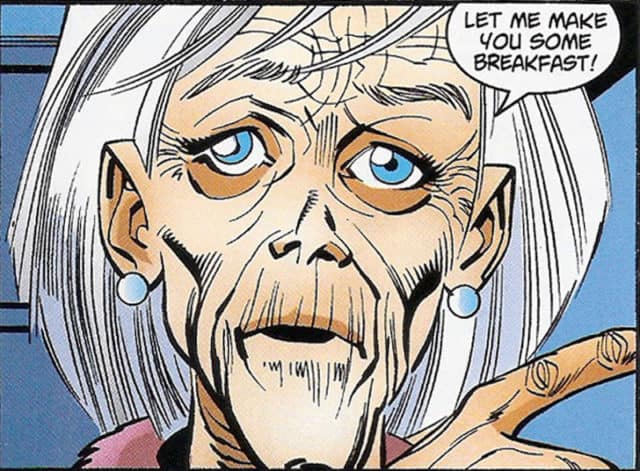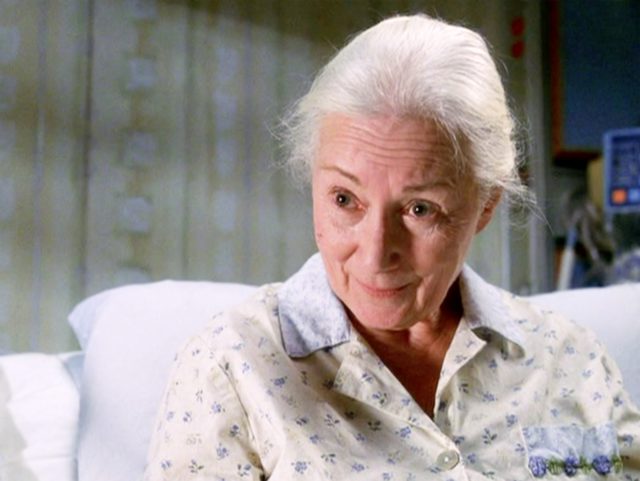
When it comes to Peter Parker’s supporting cast, few characters are as fondly remembered as his dear old Aunt May. The widowed husband to Peter’s late Uncle Ben, she raised him in his parents absence since he was a boy. Especially after the death of her husband and since becoming Spider-Man, she has become the one stable point in his otherwise chaotic life.
For as popular as she is, people tend to forget that her use in Spider-stories has always been strictly utilitarian. She’s an infirmed old lady for Peter to take care of. The most agency she tends to get is almost discovering his double life as Spider-Man. Usually she just makes him a sandwich, worries aimlessly over bills she can’t pay and gets into danger at the most inopportune times.

Seriously, that’s it. She is functionally a convenient, stakes-raising plot device to amp up the tension in the third act of any given adventure and spends the vast majority of time either kidnapped or on death’s door. She doesn’t have a say in the course of her own life and doesn’t get to have anything meaningful to outside of Peter’s mundane civilian life.
To their credit though, Marvel has been experimenting with ways to make her more interesting in the media she’s appeared in over the last few years. In the comics,, she married the father of Peter’s old boss J. Jonah Jameson (owner and editor-in-chief of the Daily Bugle). Although even then, the “interesting” part of her globetrotting to help underprivileged third world villages is the fact that Jameson and Peter are now brothers-in-law.

To date, my favorite version of the character is the one that appeared in the Ultimate Spider-Man animated series. Just on the surface, she already looks the part of an aunt, rather than the grandmother-figure that she’s typically portrayed as being. She’s a silver-haired, getting-up-there woman with a vibrant social life (and lengthy list of hobbies) that is completely independent of Peter. She even dates “Principle” Coulson for a short time: not just because of the awkward spot that the show’s writers could put Peter in, but because they were a well-matched pair of characters that complimented each other’s strengths and personalities.
By themselves, those would have been more than enough reasons to put her over the top in a competition of “Best Aunt May.” Sure, Rosemary Harris was a comic-perfect actress for the comic version of the character. And yes, Sally Field was a more appropriately aged version of the character for being Peter’s Aunt. None of them, however, could have been said to have had a life outside of what Peter’s villain-of-the-week plot called for, however.

But that’s not all Ultimate Spider-Man had in store for Aunt May, however. In the third season finale, Spider-Man frees the captive citizens of New York from being the expendable stakes in a deadly game played between the Collector and the Grandmaster (in the movies, played by Benicio del Toro and Jeff Goldblum respectively). As the spaceship explodes around them, Aunt May comes running through the crowd, screaming for her nephew.
And so Peter, dressed as Spider-Man, runs over to her. He assures her coyly that her nephew is fine and that she needs to escape while there’s still time to. She looks straight in his eyes and says “don’t patronize me. I lose Ben, I won’t lose you too, Peter.”

Later, unmasked on a rooftop, Peter asks is aunt “when exactly did you figure out I was Spider-Man?” She admits that she “just always kn[ew].”
Of course she would hear him sneaking in and out of their tiny, thin-walled apartment every night. Of course she would see the fresh cuts and bruises on him that would coincidentally show up whenever Spider-Man had a newsworthy battle with a deadly supervillain.

He’s a teenager. She’s his guardian. He can’t keep this kind of secret from her: at least, not for long.
Which brings us to Spider-Man’s latest big screen outing, Spider-Man: Homecoming. This version of Aunt May might not quite be as quick on the uptake as her animated counterpart, but she’s no fool. She knows he sneaks out at night and back in each morning. She knows he ditches in the middle of school trips and runs out in the middle of detention.

She knows that he’s angry and frustrated and desperately trying to work through his uncle’s death: poorly as often as not. So is she. And when he leaves the apartment in the middle of the night, she takes note of it, but lets him find his own way through the tragedy: even letting him join an internship that is clearly eating into all of his free time and forcing him to drop all of his extra curriculars.
And by the end of the movie: boom, there it is. It’s a small apartment. He’s a “not nearly as careful as he thinks he is teenager.” She walks in on him in his Spidey-suit and gets a first-hand crash course on exactly what her nephew spends all of his time doing late at night.

She didn’t always have to know it. She didn’t have to intuit that her son had implausibly become a superhero. They share a small living space. She’s nobody’s fool. She found out. And not as a major, climactic plot point either, but in a post-credit scene as a complete narrative afterthought.
And that’s exactly how this character — and, by extension, the entire Spider franchise — works best. I understand the appeal of secret identities, especially when the heroes in question are minors whose guardians might have a thing or two to say about them risking their life on a daily basis, but it can’t just be an excuse to keep some characters in the dark and artificially raise the stakes with “what if they find out this time?”
Peter is a kid. He lives with an adult. He had a good run, but he can’t keep that kind of secret under wraps forever. At least give May some more credit than that.
 Follow Us
Follow Us




